
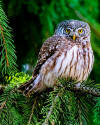
|
|

|
 |
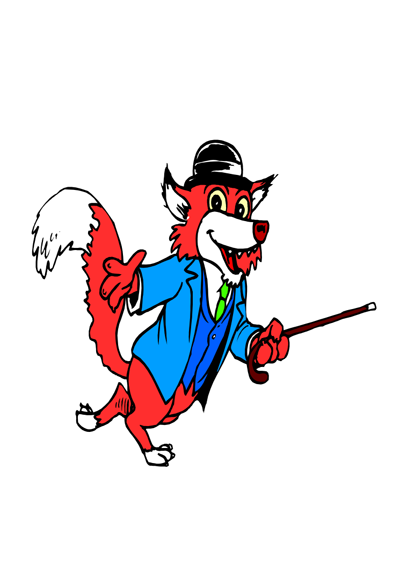
Animal
Farm Guide
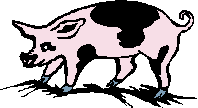
On
Animal
Farm, a
book by
George
Orwell
Questions gathered/collected over the years...
Man's wickedness & corruption by power
A satire on dictatorship in general & Russian
dictatorship in particular
Historical events, parallels story and Russia
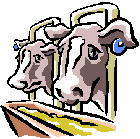
Now what is the Manor Farm, and how would you
describe it?
What do you know about the Russian Revolution?

When did it take place ?
What about the dates October 23, 1917 &
November 7, 1917?
What's Comintern?
Describe Old Major, Napoleon, Snowball & Mr.
Frederick!
Any parallels in real life?
What windmills do you know of?
What happened eventually to Trotsky and where?
Why do you think this happened?
How would you explain the differences between
Stalin's interpretation of Marx and the true Marx doctrines?

What about "kulaks" and collectivization?
Which of the characters do you like most?
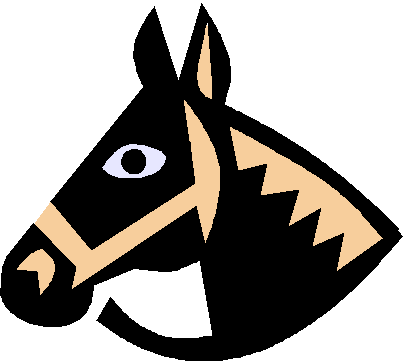
Which one goes through more hardships than others?
Is there any particular character that changes drastically through the story?
|
Now
here are
some questions
on Animal Farm, Chapter 1 |
|
1
|
Why did Old
Major assemble a meeting? |
|
2 |
How did he describe the lives of the animals? |
|
3 |
Who did he say was the cause of all their evils? |
|
4 |
What message
did he wish to pass on to the other animals? |
|
5 |
How was he suddenly disturbed in the middle of his speech? |
|
6 |
What question
had to be settled before he could go on? |
|
7 |
What was the result of the voting? |
|
8 |
What was the song about? |
|
9 |
How was the song received by the other
animals? |
|
10 |
Why did they suddenly have to break up the meeting? |
|
Chapter 2 |
|
1 |
Who were the most prominent pigs? Describe their different
characters! |
|
2 |
How did most of the animals react to the new teachings? |
|
3 |
What questions did Mollie ask and why was she not
satisfied with the answer? |
|
4 |
Why was Moses
hated by many of the animals?
What did he tell them about Sugarcandy
Mountain? |
|
5 |
The rebellion
came earlier and was more easily carried out than they had expected. How
come? |
|
6 |
How did they spend the first few hours of their freedom? |
|
7 |
What did they do with the farmhouse? |
|
8 |
What important
matter had to be attended to before they began the harvest? |
|
9 |
What did the Seven Commandments say/tell? |
|
|
Chapter 3
|
Chapter
1 Why did it fall upon the pigs to organize the work? 2 What was the great difference between their lives now and in Mr Jones’s time? 3 Who was the hardest worker? Who was the worst
worker? 4 How were the Sundays spent? 5 Who were the most active debators at the meetings? 6 What was, however, rather remarkable? 7 How did the reading and writing classes turn
out? 8 How were the
Seven Commandments changed (and simplified)? 9 What did Napoleon think of Snowball’s arrangements? 10 What did Napoleon
do with the newborn puppies? 11 What happened to the milk every day and how was that explained by Squealer? |
Chapter
|
1 |
What was the first reaction of the neighbours, Mr Pilkington and Mr Frederick, when they heard about the rebellion on Animal Farm? |
|
2 |
What did they decide to do early in October? |
|
3 |
How was the farm
defended by the animals?
|
|
4 |
What made the men finally turn and run away? |
|
5 |
How was the victory celebrated? |
|
6 |
How is it shown the pigs are not keeping to the
principle of equality? |
|
7 |
What anniversaries did they decide to celebrate
in the future? |
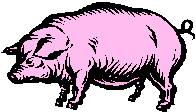
Chapter 5 ?
Make your own questions here!
You can't expect somebody else to make everything for you, right?
Chapter 6
|
1 |
How did the animals work? |
|
2 |
What about the coming
winter? |
|
3 |
|
|
4 |
Were there any unforeseen
shortages? Were there any
particular needs? |
|
5 |
Some needs had to override
everything else. What needs were those? |
|
6 |
What were some of the
earliest resolutions made at the first meeting after Jones was expelled? |
|
7 |
How did Squealer set
their minds at rest? He assures them something...
“had never been passed.” |
|
8 |
|
|
9 |
|
|
10 |
|
Chapter 7
|
pp 45-55 (Pages may vary depending upon
edition!) |
|
|
1 |
What part of the year are
we talking about here? |
|
2 |
What was it like? |
|
3 |
What is sleet? Explain in
English! |
|
4 |
What was were the animals
primarily engaged in? |
|
5 |
What is said about
Snowball? |
|
6 |
Nothing could be done
for a long time because the quarry was full of what? |
|
7 |
Explain what a quarry is! |
|
8 |
Which animals never lost
heart? |
|
9 |
What did Squealer do? |
|
10 |
When did food fall short? |
|
11 |
What about the
potato crop? … only a few were edible… |
|
12 |
Some days there was
nothing to eat bt what? |
|
13 |
Napoleon ordered the
almost empty bins in the store-shed to be filled almost to the brim with
sand. Why? |
|
14
|
What did Squealer
announce one Sunday morning? |
|
15 |
Who had sold himself
according to Squealer? |
|
16 |
What happened to the four
pigs, the three hens, a sheep
and two other sheep? Why? |
Chapter 8
|
pp 56-68 (Pages may vary depending upon
edition!) |
|
|
1 |
What was the Sixth
Commandment? |
|
2 |
How thick were they
building the walls of the windmill this time? |
|
3 |
Compare and transform
into Swedish standard 18 inches and
3 feet! |
|
4 |
Napoleon was now referred
to as … |
|
5 |
Napoleon was engaged in
negotiations regarding what? |
|
6 |
What about the
bank-notes? |
|
7 |
What happened after the
affair with the bank-notes? |
|
8 |
Frederick and his men
halted where? Where did they halt? |
|
9 |
What tools did two of the
men produce. (had
brought…)? |
|
10 |
What happened to the
windmill? |
|
11 |
What happened after that? |
-"And so the tale of confessions and executions went on, until there was a pile of corpses lying before Napoleon’s feet and the air was heavy with the smell of blood.
When it was all over, the remaining animals, except for the pigs and the dogs, crept away in a body. They were shaken and miserable. They did not know which was more shocking—the treachery of the animals which had leagued themselves with Snowball, or the cruel retribution they had just witnessed."-
Key figures/characters: assumptions, possible parallels
Mr
Jones - the
Czardist regime
Mrs
Jones - those who fled
after the Revolution belonging to the old
regime
Mr
Pilkington - Conservative
British Government 1917 - 45
Foxwood -
England
Mr
Frederick - Hitler
& the Nazi regime
Pinchfield - Germany
Mr Whymper
- could be European Socialists and Communists working for co-existence with the
U.S.S.R.
Old
Major - Lenin (with some traits of Marx) founder of
the Bolshevik Party, 1912
Napoleon - Joseph Stalin
Snowball - Leon Trotsky
Squealer - Communist
propaganda, especially as voiced by Pravda (since 1918)
Boxer - the urban working class, proletarians, all loyal to the Revolution
Moses - the Russian Orthodox Church
the dogs - the Soviet Russian Secret Police
the
black cockerel - the Soviet Army
the
sheep - the body of the Communist Party,
the windmill ? the 5-year plans
-Orwell, George, a pseudonym of
Eric Arthur Blair (1903-1950), a British novelist, essayist, and critic whose
brilliant reporting and political conscience fashioned an impassioned picture of
his life and times.
Orwell was born in Motihari, India, but grew up in England where he was educated at Eton College. He served with the Indian Imperial Police in Burma (now Myanmar) from 1922 to 1927, when he returned to England determined to make a career as a writer.-
Hints on Searching - Söktips
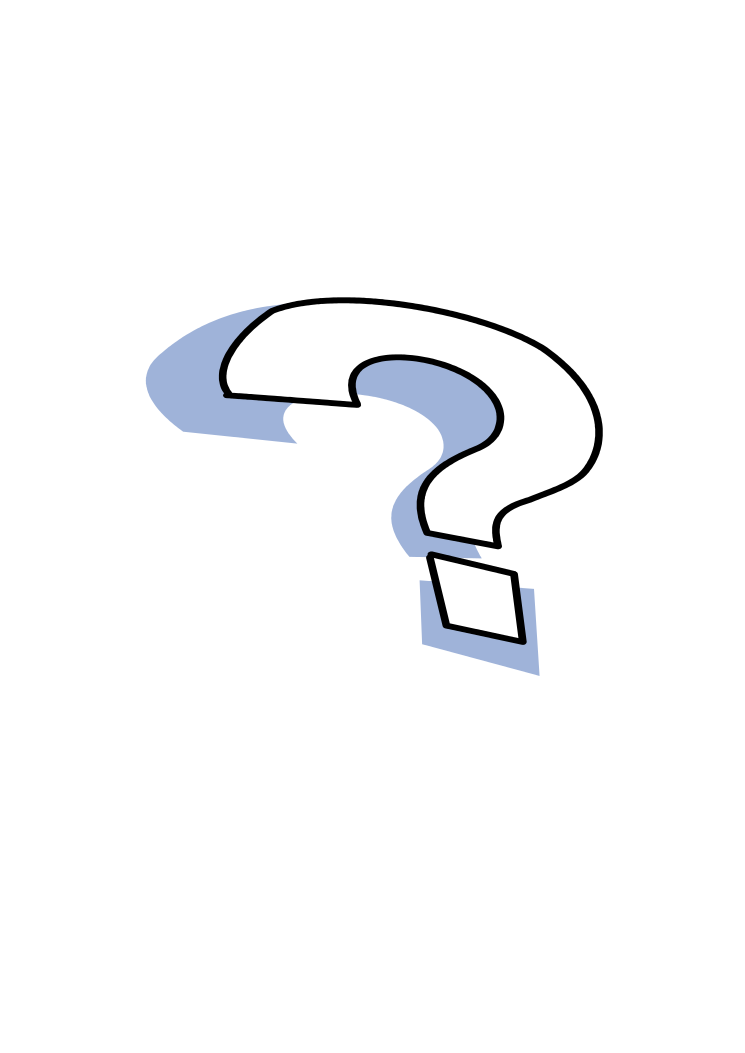 |
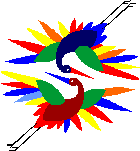 |
|
|
|
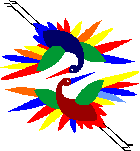 |
|
 |
|
|

© Swengelsk, KB ® webmaster |
|
|
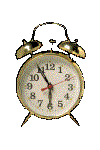 |